The top prize for a falconry competition in the United Arab Emirates can reach up to $7 million, according to Business Insider.
Every winter morning, Hamad Al-Falasi and his team wake up before dawn and drive their rugged 4×4 vehicles into the harsh Arabian desert. Before the sun rises above the golden dunes, the men have already savored their hot coffee and brought along a small army of falcons to begin the challenging training process.
There are dozens of different species of falcons – brown Peregrines with white spots, Gyrfalcons in silver with black and bluish-gray speckles, along with many birds bred for speed or combat prowess.
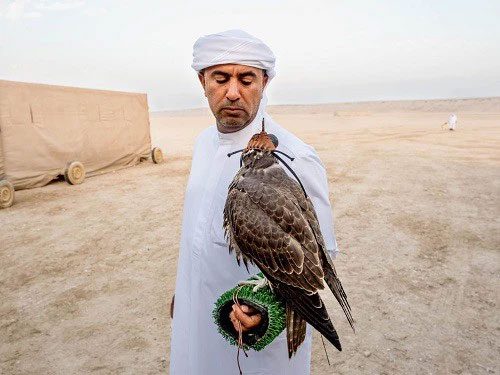
Falcon training is a prestigious profession in the UAE. (Photo: Business Insider).
Mr. Al-Falasi is the head trainer of the Abu Dhabi Falcon Club (ADFC) – a government-owned organization established in 2013 that specializes in falcon training in the UAE. For a long time, falcons have been a part of the historical world culture, particularly as a central element of Middle Eastern culture.
The Bedouin Arabs, nomads of the region, have been capturing migratory falcons for thousands of years and training them to hunt in the desert, seeking typical prey such as large birds known as houbara, rabbits, pigeons, and even gazelles.
Dubai residents have transitioned from a nomadic lifestyle to a modern way of life in Dubai and Abu Dhabi, but as the country and its people have become wealthier in recent decades, falcons have once again gained popularity.
Falconry competitions have become a major attraction in the UAE after the Crown Prince of Dubai introduced the sport in the early 2000s, coinciding with a ban on hunting to protect endangered species. Mr. Al-Falasi and the club’s falcon training team are focusing on competing for the President’s Cup in a contest overseen by the rulers of the UAE, with a prize pool of up to $7.35 million and 73 cars.
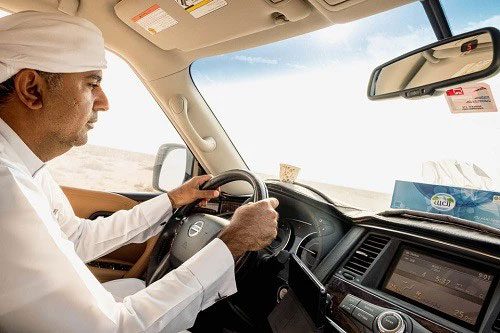
Hamad Al-Falasi has been training falcons for a long time. This skill is often passed down from father to son. Dubai residents often teach their children how to care for the birds as a means to instill discipline and knowledge of the desert. (Photo: Business Insider).
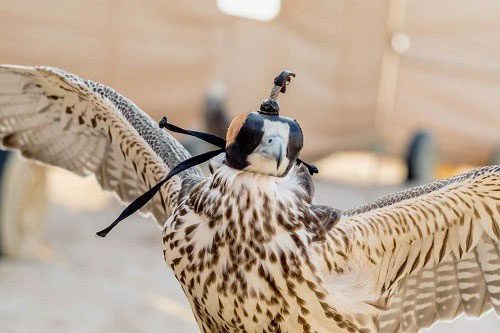
“I started training falcons when I was 12 years old. I do this job because my father did too,” Saeed Al-Hamli, the administrative manager of ADFC, told a reporter while stroking a newly purchased gyr-peregrine falcon. (Photo: Business Insider).
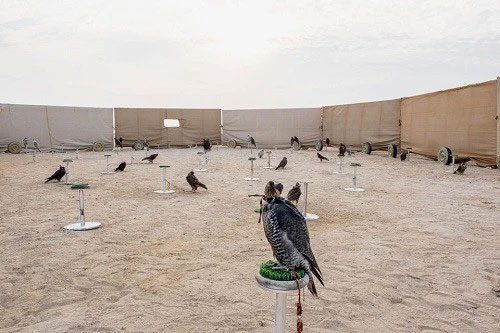
Falcons typically go out once at dawn and once in the evening during the hunting season as well as for races to train their trainers. (Photo: Business Insider).
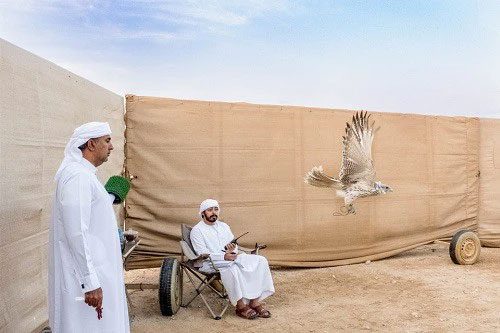
Mr. Al-Falasi only owns one falcon, but he trains dozens for the club’s busy members. More than half of the 66 members are Muslim or royal, but ADFC has worked to expand community membership with clinics and introductory classes for schoolchildren. (Photo: Business Insider).
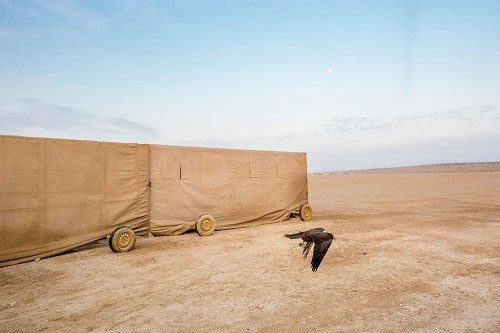
Some falcons are trained for hunting, while others are trained for racing. There are different training regimes for each type of bird to build endurance, energy, and muscle mass. Racing falcons are trained like sprinters, while hunting falcons are trained like long-distance runners. (Photo: Business Insider).
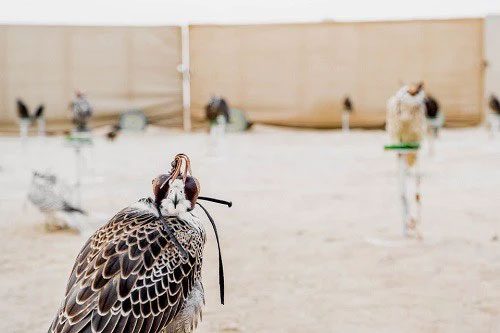
UAE officials have banned hunting after falconers nearly focused on hunting houbara – a desert bird the size of a turkey prized for its meat. The strongest falcons continue to hunt. The best places for hunting are Pakistan, Libya, Sudan, and Iraq, which Al-Hamli refers to as a “paradise for falcons.” However, due to conflict, most falconers now focus their hunting in Morocco, Jordan, and Saudi Arabia these days. (Photo: Business Insider).
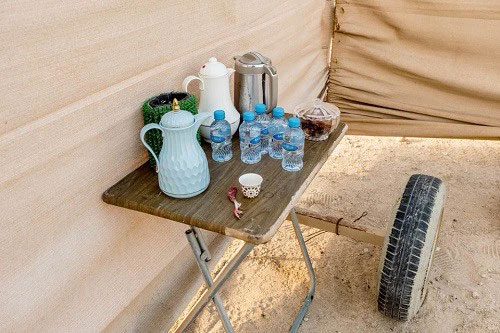
“There is not much hunting allowed anymore, but we want falcons to remain a part of the culture. That is why we encourage racing,” Mr. Al-Hamli said. Trainers start their mornings with coffee or tea. (Photo: Business Insider).
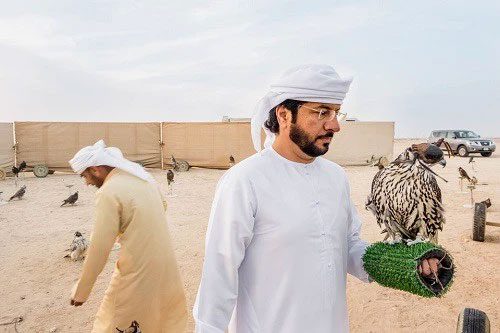
Falcon races occur seasonally, from October to March each year, with a total of 9 races, culminating in the President’s Cup. (Photo: Business Insider).
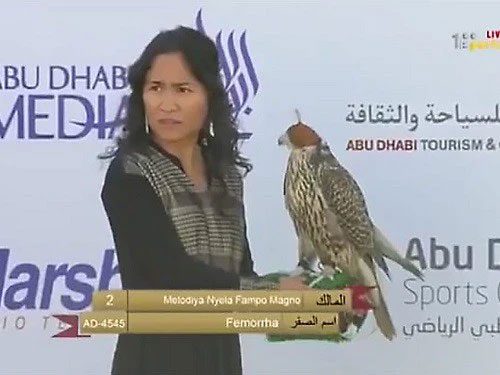
The ownership of falcons has surged in the UAE, and while falcon trainers are typically men, a segment of women has begun to participate in ADFC in the emirate, with Ayesha Al-Mansoori and South African falconer Angelique Engels joining since 2016. By 2018, Melodiya Nyela Fampo Magno – a Filipino veterinarian working for the royal family won about $2,700 while participating in the President’s Cup. (Photo: Business Insider).
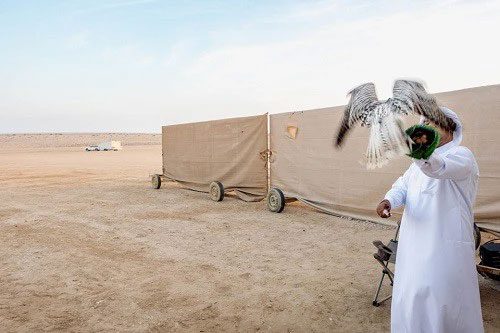
The rising demand in the Middle East also brings many negative impacts. Falcon traders in Pakistan, Russia, and elsewhere are capturing migratory falcons to sell to wealthy Arabs. The Saker falcon, a favorite of Arabs, is threatened with extinction due to habitat degradation and a surge in smuggling. Other falcon species are also declining in their natural environments. (Photo: Business Insider).


















































